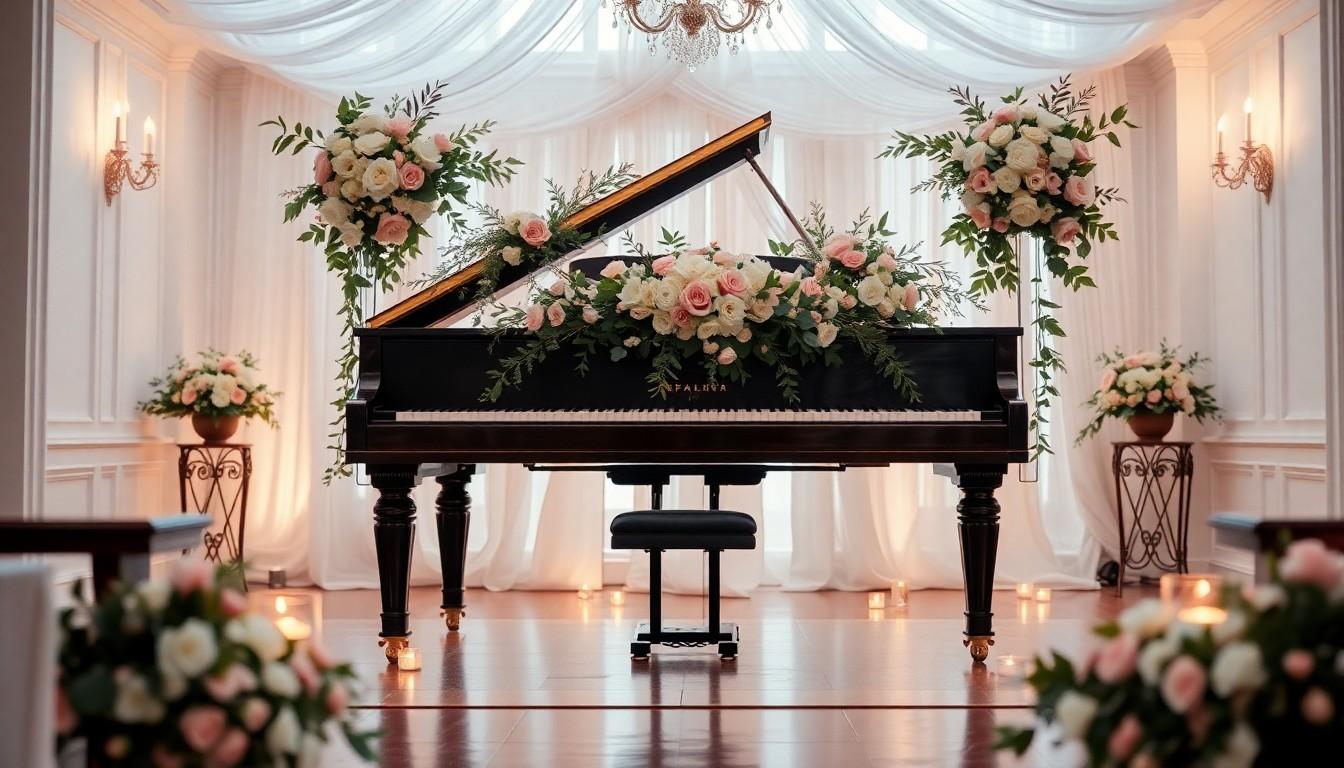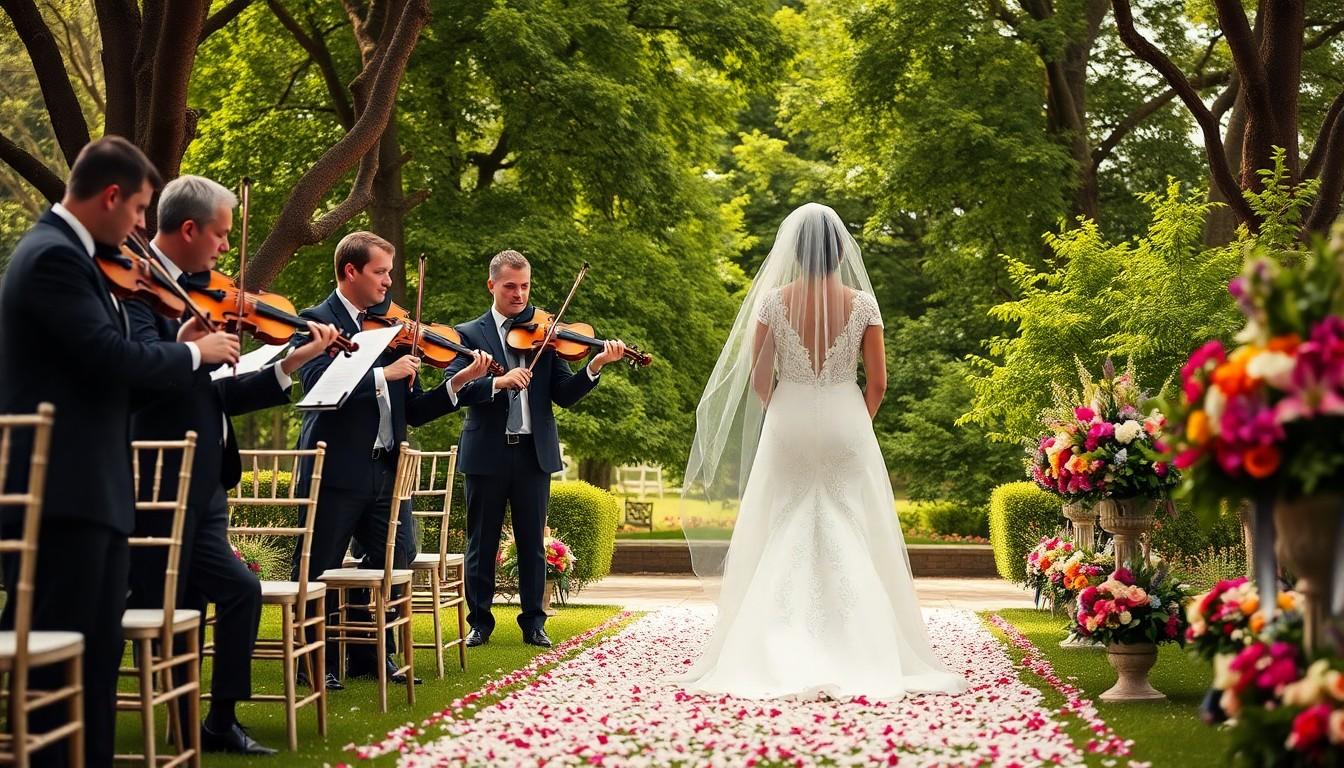Picture this: a beautiful bride gliding down the aisle, her heart racing as the sweet strains of classical wedding music fill the air. It’s a moment that feels timeless, and it’s no accident. Classical music has a way of elevating weddings from ordinary to extraordinary, wrapping couples in an enchanting embrace of elegance and romance.
From the majestic notes of Pachelbel’s Canon in D to the soaring melodies of Wagner’s Bridal Chorus, classical wedding music offers a rich tapestry of sound that speaks to the soul. It’s like the perfect pair of shoes for your wedding day—elegant, classic, and just the right fit. So, if you want to ensure your big day hits all the right notes, dive into the world of classical wedding music and discover how it can transform your celebration into a symphony of love.
Table of Contents
ToggleOverview of Classical Wedding Music
Classical wedding music plays a vital role in setting the tone for ceremonies. Many couples select pieces that enhance the romantic ambiance and create memorable moments. Pachelbel’s Canon in D remains a popular choice for processions, celebrated for its beautiful progression and emotional resonance.
Wagner’s Bridal Chorus, often associated with traditional weddings, signals the arrival of the bride. This piece has become a timeless classic that many expect to hear during the ceremony. Other compositions, such as Vivaldi’s “Spring,” also add an uplifting element, bringing joy to the celebration.
Additionally, the selection of classical music varies according to cultural preferences. Some might choose compositions that reflect heritage, incorporating pieces from composers like Mozart or Bach. The range of options allows couples to personalize their ceremonies while maintaining a sophisticated atmosphere.
Live performances further enhance classical music’s impact at weddings. Hiring string quartets or soloists can bring depth and authenticity to the musical experience. Attendees often appreciate the live interpretation of beloved pieces, creating an intimate connection among guests.
Moreover, classical wedding music extends beyond the ceremony to receptions. Many couples opt for classical selections during dinner or as background music, promoting a relaxed environment. Incorporating classical themes into various wedding stages helps maintain a cohesive and elegant narrative throughout the day.
Couples benefit from exploring the vast repertoire available, allowing for unique expressions of their love story. Embracing classical music contributes significantly to the overall wedding experience, instilling a sense of warmth and elegance.
Popular Classical Compositions

Classical compositions hold a treasured place at weddings, enhancing emotional depth and creating lasting memories. Below are notable pieces often chosen for their beauty and significance.
Bridal March by Wagner
Wagner’s Bridal March, from the opera Lohengrin, represents a quintessential wedding piece. This composition signals the bride’s grand entrance, capturing attention and adding a sense of anticipation. Its rich orchestration and soaring melodies create an atmosphere of romance and elegance. Many couples select this piece for its traditional roots, symbolizing the start of their new journey together. Often associated with royal weddings, the Bridal March invokes a feeling of timelessness that resonates deeply with both the couple and their guests.
Air on the G String by Bach
Bach’s Air on the G String, from the Orchestral Suite No. 3, presents a serene and lyrical quality, making it a popular choice for ceremonies. The piece’s flowing melody brings a sense of tranquility, inviting reflection and emotion. Couples frequently enjoy using this piece during key moments, such as the signing of the register or as background music for intimate moments. Its gentle harmonies create a peaceful ambiance, allowing the love shared during the ceremony to shine brightly. Many musicians perform this work beautifully on string instruments, further enhancing its heartfelt appeal.
Incorporating Classical Music in Weddings
Classical music plays a pivotal role in weddings, enhancing the emotional atmosphere and creating lasting memories. Couples can thoughtfully select pieces for both the ceremony and reception to personalize their celebration.
Ceremony Music
Ceremony music sets the stage for the wedding’s emotional highlights. Pachelbel’s Canon in D often marks the procession of the bridal party, creating an enchanting ambiance. Wagner’s Bridal Chorus traditionally accompanies the bride’s entrance, symbolizing new beginnings. Other classical options, like Mendelssohn’s Wedding March, add grandeur to the moment. Couples may also consider contemporary arrangements of these classics, offering a fresh twist on traditional favorites. The choice of music not only reflects the couple’s taste but also resonates with the guests, enhancing the overall experience.
Reception Music
Reception music maintains the celebration’s energy and enhances the festive mood. String quartets or piano soloists often perform classical pieces during dinner, providing a sophisticated backdrop. Popular selections include Vivaldi’s Four Seasons, known for its lively and engaging melodies. Couples may also incorporate waltzes, such as Strauss’s Blue Danube, encouraging guests to dance and enjoy the festivities. The right blend of classical music fosters an inviting atmosphere, allowing everyone to celebrate together. By curating a memorable playlist, couples create a unique soundtrack that reflects their love story throughout the reception.
Choosing the Right Pieces for Your Wedding
Selecting the right pieces for a wedding significantly enhances the event’s ambiance. Couples should carefully consider their personal preferences and how well the music fits their wedding themes.
Personal Preferences
Personal preference matters when choosing classical music for weddings. Couples may find themselves drawn to specific composers or pieces that resonate with their love stories. For example, beloved selections like Pachelbel’s Canon in D evoke strong emotions, while others might prefer the grandeur of Wagner’s Bridal Chorus. Selecting music that holds personal significance can create an unforgettable atmosphere for the ceremony and reception.
Harmonizing with Themes
Harmonizing classical music with wedding themes elevates the overall experience. Couples often reflect on their wedding’s color schemes and motifs when selecting music. For a romantic theme, pieces like Mendelssohn’s Wedding March and Debussy’s Clair de Lune fit beautifully. Couples planning a lush garden ceremony may choose Vivaldi’s Spring for its vibrant energy, while a more formal celebration might include Bach’s Air on the G String for elegance. Thoughtful music choices align with the wedding’s overall style, enhancing every moment.
Classical wedding music serves as an essential element in crafting a memorable and elegant celebration. Its ability to evoke emotion and enhance the atmosphere makes it a cherished choice for many couples. By thoughtfully selecting pieces that resonate personally and align with their wedding themes, couples can create a unique soundtrack that reflects their love story.
Whether it’s the timeless beauty of Pachelbel or the joyous notes of Vivaldi, classical compositions add depth and sophistication to the day. The right music transforms each moment into a cherished memory, ensuring that the celebration is not only beautiful but also deeply meaningful. Embracing classical music can truly elevate the wedding experience, leaving a lasting impression on all who attend.




